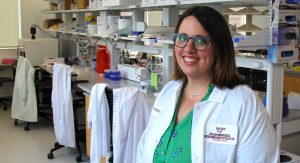Jennifer Munson, an associate professor at the research institute, will use the $500,000 award to study whether existing drugs for other diseases can be used to target a protein involved in the invasion and progression of glioblastoma multiforme tumors

Jennifer Munson, an associate professor at the Fralin Biomedical Research Institute at VTC, is the 2021 recipient of the Ben & Catherine Ivy Foundation Emerging Leader award to further her study of patient-specific therapies for deadly brain tumors.
Munson is an expert in interstitial fluid flow, the movement of liquid within human tissues, including tumors. The two-year, $500,000 grant will fund research on how understanding the role of fluid flow in glioblastoma might lead to new therapies for it.
Glioblastoma is notoriously resistant to treatments, including ones that are effective on other forms of cancer. Fifteen thousand Americans are diagnosed annually with glioblastoma, according to the Ivy Foundation, and 90% won’t survive three years with the disease.
The Arizona-based foundation funds promising brain cancer research with the potential to lead to long-term survival and high quality of life for patients. The Emerging Leader award supports early-to-mid-career investigators conducting high-impact, high-reward research with the potential to translate into clinical treatments.
“This grant will allow us to build upon research in which we’ve identified a particular protein that appears to be important to how fluid flow affects the invasion and progression of glioblastoma,” said Munson, who also is an associate professor in the Department of Biomedical Engineering and Mechanics in Virginia Tech’s College of Engineering.
The protein expression increases when exposed to fluid flow around tumors, Munson found. Her lab will study whether targeting the protein receptor could be a useful therapy against glioblastoma and whether there’s a patient population that would benefit from targeting it.
Munson specializes in engineering tissue models that replicate the tumors of individual patients, allowing study of how the therapy can be improved at a patient-specific level. Her lab will use these models, along with mouse models, to determine if some drugs already in use for other diseases, such as Parkinson’s disease, are good therapies.
“The Ivy Foundation is one of the premier foundations that’s funding brain tumor research aimed at being translated into clinical use,” Munson said. “Our research shares that focus on moving what we learn from the lab into clinic where it can help patients. We’re grateful to have the foundation’s confidence.”
About the Ben and Catherine Ivy Foundation
The Ivy Foundation is the nation’s largest privately funded foundation with a mission of improving survival and quality of life for people diagnosed with a brain tumor. The Ivy Foundation’s approach is to fund Patient Focused Research (PFR) with gliomas to improve diagnostics and treatments for patients. PFR keeps the patient and relevant clinical issues at the center of every research project. Since its inception in 2005, the Ivy Foundation has donated over $120 million to cutting-edge research with the expectation that this will lead to an eventual cure for brain cancer. In 2018, the Ivy Foundation made a $50 million gift, the largest private grant in the history of brain tumor research, to establish the Ivy Brain Tumor Center at Barrow Neurological Institute. The Ivy Brain Tumor Center is the largest Phase 0 clinical trials program in the world and the first of its kind in neuro-oncology. Follow the Ivy Foundation on Facebook, Twitter and LinkedIn.

